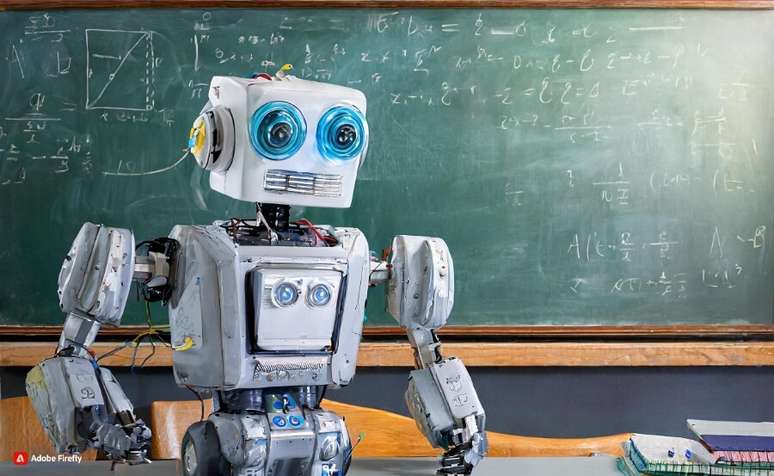With the constant advancement of technology come countless opportunities to improve learning
The integration of artificial intelligence (AI) into education has revolutionized the way students learn and develop. With the growing adoption of this innovative technology in classrooms, numerous benefits emerge that enhance student education.
In this constantly evolving scenario, Artificial Intelligence emerges as a powerful ally to personalize the student path. Among the various improvements is the application of artificial intelligence to complement the tutorials carried out by teachers, helping students with their doubts and improving learning at any time.
Ricardo Marcatto, director of CPETCenter for Professionalization and Technical Education, listed the top 10 benefits of using artificial intelligence in student education.
Personalization of teaching
The personalization of teaching through Artificial Intelligence represents a significant progress in the educational field. This innovative approach allows for the dynamic adaptation of educational content based on the learning pace and individual needs of each student. Using advanced algorithms, artificial intelligence analyzes student performance and understanding, delivering a more effective and personalized educational experience.
By personalizing instruction, educators can identify gaps in each student’s knowledge and provide specific interventions to strengthen areas of difficulty. This contributes to more efficient learning.
Immediate feedback
Another benefit of AI in teaching is immediate feedback. This revolutionary feature allows students to receive immediate feedback on their performance, allowing for a quick and accurate understanding of their gaps and areas for improvement.
Thanks to the immediate feedback from the AI, students have the opportunity to correct errors and improve their understanding almost instantly. This not only accelerates the learning process, but also strengthens students’ autonomy and responsibility for their own academic progress.
Access to information
AI makes it easier to access information from large amounts of data in an organized way, giving students the opportunity to improve their research and critical analysis skills.
With artificial intelligence, students can explore a variety of information sources efficiently and effectively. Intelligent algorithms help organize and classify data, making information search faster and more accurate. This not only optimizes research time, but also develops students’ ability to navigate and critically evaluate resources.
Stimulate creativity
By using artificial intelligence to generate tasks and activities that stimulate creativity, educators can inspire students to explore unique solutions and original approaches to problems.
Intelligent algorithms can create challenging and engaging scenarios, encouraging students to apply knowledge creatively and develop problem-solving skills.
Collaborative learning
Artificial intelligence helps build a more dynamic and participatory learning environment. AI tools can be designed to suggest collaborations based on each student’s individual interests and skills, promoting the formation of more efficient and diverse study groups.
It can support you in creating collaborative activities, such as group projects, discussion forums and problem-solving activities.
Identification of learning difficulties
By analyzing student performance data, AI can identify patterns that indicate specific potential challenges, allowing for targeted interventions tailored to each student’s individual needs.
AI algorithms can analyze variables such as time spent on activities, responses to questionnaires, interactions in online activities and other learning-related data. By detecting inconsistent patterns or areas of underperformance, AI can alert educators and support practitioners, enabling early intervention.
Improve your rating
The presence of AI in education also pushes for the improvement of evaluation methods. AI tools provide more comprehensive and fair assessments, taking into account students’ different abilities and learning styles.
AI tools can offer more diverse forms of assessment, going beyond traditional standardized tests. They can include interactive simulations, hands-on projects, performance analyzes in collaborative tasks, and other approaches that better capture students’ range of skills and knowledge.
Efficiency in school management
Another benefit of using Artificial Intelligence in school education is management. It helps streamline administrative processes by automating routine tasks and providing analytical insights. In this way, AI gives teachers more time to focus on pedagogical development and personalized support for students.
AI systems can be deployed to manage school administration, automating tasks such as enrollment, timetable management, attendance tracking, reporting, and other administrative operations. This not only reduces manual workload but also minimizes errors, improving the overall efficiency of the school.
Educational inclusion
AI systems can be designed to support students with special needs by adapting educational content, activities and assessment methods based on individual abilities. This allows for a more personalized and accessible education, ensuring that all students have the opportunity to fully participate in the educational process.
Prepare for the future
The use of artificial intelligence in training students familiarizes them with emerging technologies, preparing them for a future where the ability to interact with intelligent systems will be increasingly essential.
In an ever-evolving educational landscape, Artificial Intelligence emerges as a powerful tool to enrich the learning experience, providing significant benefits to students, educators and educational institutions.
“I have worked in education for over 34 years and have never seen a technology with so much potential to impact our lives, our educational model and the way our students learn. I understand, however, that the AI models we currently have – such as GPT-4, Claude 2, Llama, among others – are just the tip of the iceberg. There is still a lot to do and we, education professionals, must prepare ourselves more and more to use them as allies in our work and in the education of our students, without fear of being replaced, because certainly in quality education we will always be the owners” , concluded the CPET manager.
inspires transformation in the world of work, in business, in society. Compasso, a content and connection agency, is born.
Source: Terra
Rose James is a Gossipify movie and series reviewer known for her in-depth analysis and unique perspective on the latest releases. With a background in film studies, she provides engaging and informative reviews, and keeps readers up to date with industry trends and emerging talents.


![Pre -Si Grand Soleil: Summary of Episode on Tuesday, October 14, October 14, 2025 [SPOILERS] Pre -Si Grand Soleil: Summary of Episode on Tuesday, October 14, October 14, 2025 [SPOILERS]](https://fr.web.img6.acsta.net/img/90/06/9006f8922e8bfda0a3290f9a6ff3fa74.jpg)




